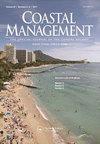Relationships between Livelihoods, Well-Being, and Marine Protected Areas: Evidence from a Community Survey, Watamu Marine National Park and Reserve, Kenya
IF 1.9
4区 环境科学与生态学
Q4 ENVIRONMENTAL SCIENCES
引用次数: 2
Abstract
Abstract At a time of massive expansion of Marine Protected Areas, there is a need to learn more about their sustainability and success. This study draws on a framework which operationalizes three-dimensions of well-being: material, relational, and subjective, in order to measure the range of benefits and disbenefits experienced by local communities from protected areas. 308 respondents from two coastal Kenyan villages adjacent to the Watamu Marine National Reserve participated in a telephone survey in June and July 2020. The study recorded varying levels of dependency on the marine environment for the livelihoods of residents. A key finding of this study was that benefits reported by participants consistently exceeded disbenefits. A principal components analysis identified that the number of benefits and disbenefits experienced explained the most variance within the dataset. The benefits and disbenefits reported contributed to each dimension of human well-being. The highest ranked benefits reported contributed to subjective well-being (‘better health’, and ‘ability to enjoy a clean and healthy creek and ocean’), and the most frequently reported disbenefits related to relational and material well-being (for instance ‘increased conflict and social tension’ ‘increased poverty’, ‘fewer supplies of food’). Practical local conservation efforts can address relational disbenefits through better partnership working, and material disbenefits by supporting pro-conservation, alternative livelihoods. The findings demonstrate the relevance of understanding social trends for marine protected area governance and management. The paper offers insights into how fundamental relations between protected marine environments, livelihoods, and well-being may affect the perceptions and success of conservation initiatives amongst local communities.生计、福祉与海洋保护区之间的关系:来自社区调查的证据,Watamu海洋国家公园和保护区,肯尼亚
摘要在海洋保护区大规模扩张之际,有必要更多地了解其可持续性和成功性。这项研究借鉴了一个框架,该框架可操作幸福感的三个维度:物质、关系和主观,以衡量当地社区从保护区获得的好处和不好处的范围。来自瓦塔穆海洋国家保护区附近两个肯尼亚沿海村庄的308名受访者参加了2020年6月和7月的电话调查。该研究记录了居民对海洋环境的不同程度的生计依赖。这项研究的一个关键发现是,参与者报告的收益始终超过不收益。主成分分析表明,所经历的好处和不好处的数量解释了数据集中最大的差异。所报告的好处和不好处对人类福祉的各个方面都有贡献。据报道,排名最高的福利有助于主观幸福感(“更好的健康”和“享受干净健康的小溪和海洋的能力”),而最常被报道的不利于关系和物质幸福感(例如“冲突和社会紧张加剧”、“贫困增加”、“食物供应减少”)。切实可行的地方保护工作可以通过更好的合作伙伴关系来解决关系上的不利影响,也可以通过支持支持保护的替代生计来解决物质上的不利因素。研究结果表明,了解海洋保护区治理和管理的社会趋势具有相关性。该论文深入了解了受保护的海洋环境、生计和福祉之间的基本关系如何影响当地社区对保护举措的看法和成功。
本文章由计算机程序翻译,如有差异,请以英文原文为准。
求助全文
约1分钟内获得全文
求助全文
来源期刊

Coastal Management
环境科学-环境科学
CiteScore
6.00
自引率
0.00%
发文量
24
审稿时长
>36 weeks
期刊介绍:
Coastal Management is an international peer-reviewed, applied research journal dedicated to exploring the technical, applied ecological, legal, political, social, and policy issues relating to the use of coastal and ocean resources and environments on a global scale. The journal presents timely information on management tools and techniques as well as recent findings from research and analysis that bear directly on management and policy. Findings must be grounded in the current peer reviewed literature and relevant studies. Articles must contain a clear and relevant management component. Preference is given to studies of interest to an international readership, but case studies are accepted if conclusions are derived from acceptable evaluative methods, reference to comparable cases, and related to peer reviewed studies.
 求助内容:
求助内容: 应助结果提醒方式:
应助结果提醒方式:


